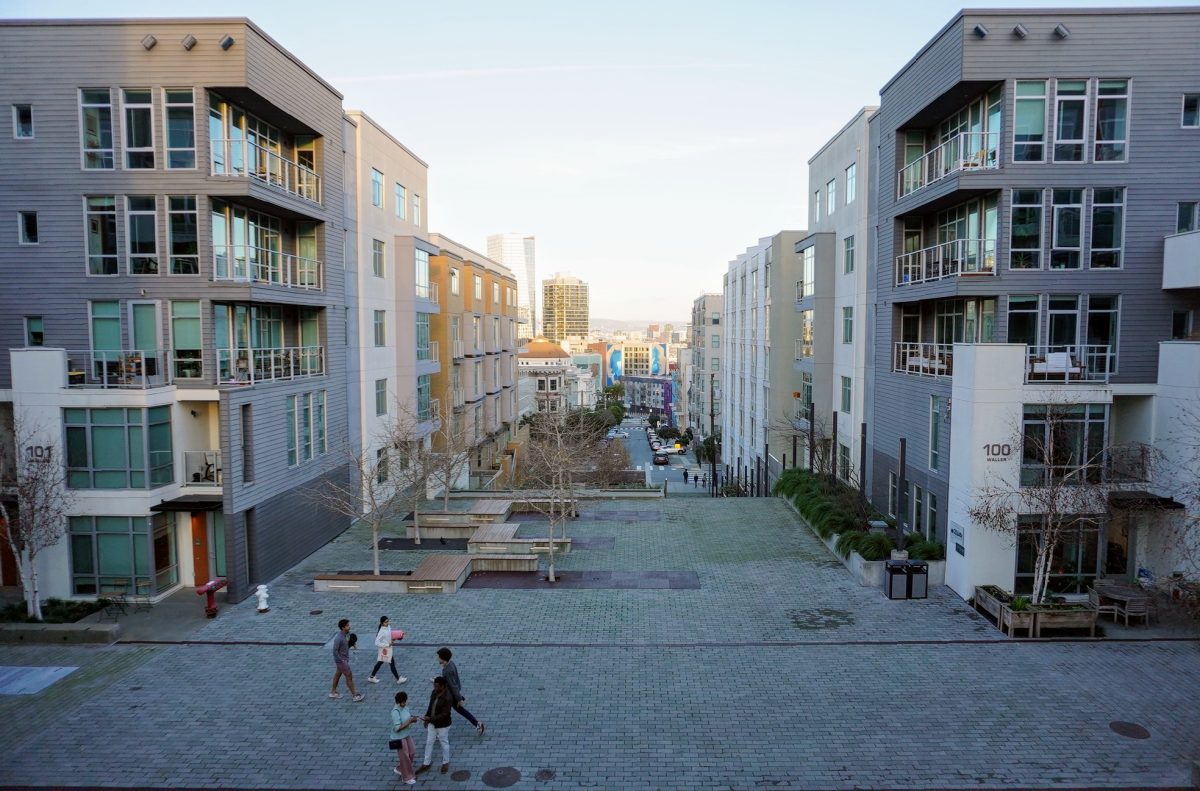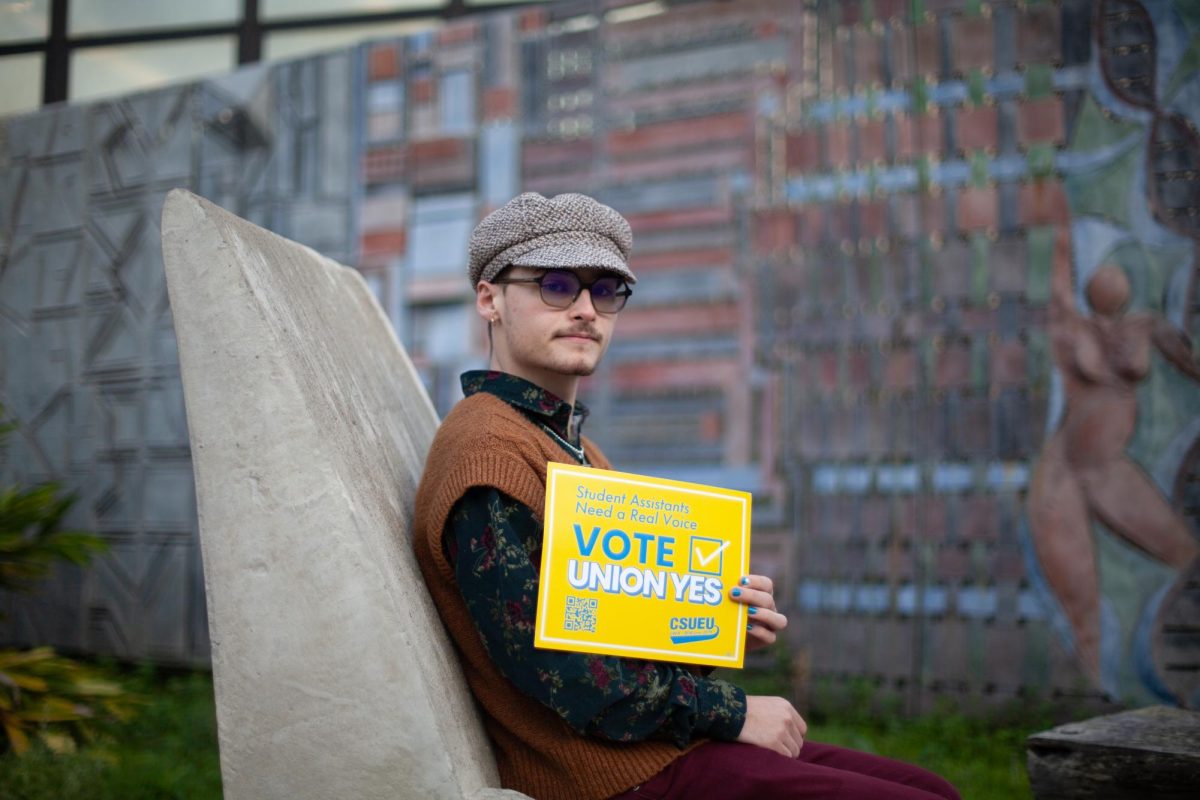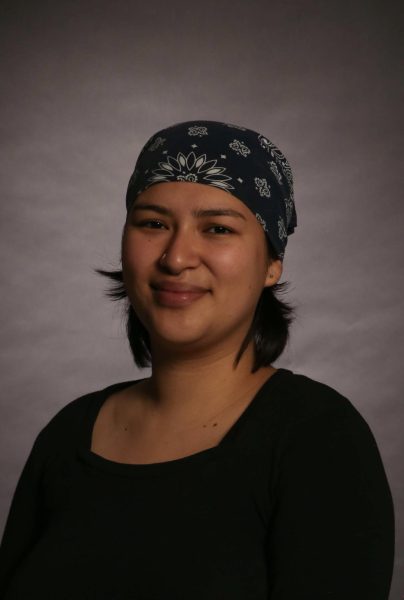Welcome to Gator Talk, the Xpress podcast that brings city perspectives to local, regional and national news.
Today’s podcast episode highlights two important stories the GGX News team reported on this summer. Staff reporter Sydni Taylor discusses her recent profile on a local business owner and artist Hiroshi Morimoto. Later in the show, staff reporter Bryan Chavez discusses his reporting on the faculty lecturers’ pay gap at San Francisco State University.
Introduction
Andrea: Hello and welcome to Gator Talk. My name is Andrea Jimenez and I’m a staff reporter with Golden Gate Xpress.
Preview of the show
Today we are sitting down with Sydni Taylor followed by Bryan Chavez, who are fellow staff reporters to discuss SFSU alumni’s journey through art and the teacher pay gap.
Interview with Sydni Taylor
Our first story is about Hiroshi Morimoto, a former SFSU student who overcame navigating a new country as an immigrant, homelessness and loss. I’m here with Sydni Taylor. How are you doing today?
Sydni: Hi, I’m doing well. How are you?
Andrea: I’m good. So today, I wanted to sit down with you and discuss your story that you just published not too long ago about the local business owner and artist Hiroshi Morimoto. So when I saw this story, I was really interested to know just how did you find out about this character?
Sydni: Oh, my God, well, he is such a character. So back in the fall semester of this year, I took reporting, and I interviewed him for another session that I had for an article that I wrote earlier in the semester. And I just remember hearing his story. And I was like, he is so interesting. So I was like, You know what, let me do a profile on him because he was just telling me about like his wife, and like, how he had all these struggles through life. And I was just like, Oh, my God, this is so like, it made me sad. So I was like, okay, let me do a profile on him. And that’s how I got into such an intensive, deep dive on this lovely man.
Andrea: I definitely when I like was reading the story. I definitely got emotional as well, just him talking about his wife, and just the struggles he’s had to live through. I mean, he said that he was homeless for a point in this time in his life. Yeah. So that was like, really pulled at your heartstrings.
Sydni: Like my favorite part was the quote, well, not my favorite. Well, it kinda Yeah. But when he talked about how he was battling the streets of Rye, I, when he talked about that I was, that’s when I just started crying. I was like, this poor man had to go through so much. And it took him a while before he was able to, you know, build up his, his profile and being able to, like, you know, be the person he is today. Like, when he told me that he moved to California, and it was really hard for him to move to California, because he had to save up a lot of money that he would get from, like, on the streets from his artwork that he got art supplies from, like, he had to steal, where the art supplies, and then he had to produce that art. And then he was able to sell some. And that’s how he was able to get a ticket to travel to Oakland. And then that’s how he was able to build off of that, which was really cool. And it was inspiring to hear because I mean, he quite literally built from nothing.
Andrea: Yeah, yeah. I’m really curious to know, what was the process of writing the story? Did you go to interview him at the market where he events or did you get to see his like, art space?
Sydni: I wish I was able to see his art space, but I saw him at the Embarcadero Market Street. Yeah, that’s where that’s where I interviewed him. That’s how I got everything. And yeah, it was really, it was really cool to see all the stuff he made. Because he makes his own hats. He makes his own shirts. It was really cool to see. And yeah.
Andrea: So in the main photo here in the article, all of those things behind him did he sewed them himself?
Sydni: He did he did it took he said it typically takes him like two hours. Like two hours. That’s especially for per shirt and hat. That’s a lot of time. What if he has, but yeah, no, he also made music when he was like 20. Yeah, as well.
Andrea: So that’s what he’s holding up.
Sydni: Yeah, he’s holding up in the photo.
Andrea: Did you get to listen to the music?
Sydni: I haven’t, but I will. I will. I should have the DVD, but I will I will listen to it.
Andrea: I wish you had it. We could have played it.
Sydni: I wish I’d had, it’s okay. It’s okay. I still have it though. It’s and it’s back on my place. So. Yeah.
Andrea: And I was really curious to know, I mean, it kind of does seem like it, but is he making a full, you know, he’s fully living off of his income that he makes at these markets.
Sydni: Um, he didn’t really specify we didn’t really talk about that. But he does get some income from this, but I don’t think he’s solely living off of this.
Andrea: Yeah. Because I mean, living in San Francisco is expensive, very expensive. So I would imagine that, you know, you’d have to be making only set amount.
Sydni: Exactly, exactly. So that’s why I’m like, I wish I did ask him that, but we did not address that.
Andrea: Oh, and I was also very curious to know, because he spoke to you about his journey coming to the states and his parents being very supportive of that decision. And then him, you know, after arriving here, not soon after becoming homeless, yeah, so I was really curious to know, um, were his parents aware of his struggles in the, in the States?
Sydni: Um, sadly, no, he did not tell his parents anything. I mean, I think back in like the 60s or 70s, I don’t think like technology was that big of a deal. So like reaching out to his family back in the, from Japan, like, I don’t think that was accessible for his family, not only for him, but his family as well. So he also mentioned in his earlier years that like his wife was very, was his inspiration for photography. That’s how he got into it. Because they originally met when he was working at Yoshis. And she saw his artwork in the restaurant, he was like, and she was mesmerized by the artwork, verbatim away. And he was like, Oh, my God, this is amazing. Like, this lady loves my work. And she’s also beautiful. So then that’s how they like, met, and they were able to, like, get to talking. And then they obviously like fell in love. And then he was so captivated by her beauty that he was like, she’s like the media of life. He is, she is someone that I want to see everywhere. So that’s how he got into photography, he would take pictures of her and have her showing, and that’s just how he got into photography. And then there was a piece that he showed me that is called the beauty of life and his vibrations collection, which was really beautiful. The clouds. And just, overall, the sunset is just absolutely amazing. And he’s showing me that and he said, she was an inspiration for that. And I was like, Oh my gosh, my heart and then when she passed away in 2008, I believe. And he’s, that’s pretty much when he was like, Okay, I’m just gonna continue working her her dream and just pretty much so in it for her like, and then sell it. And then he continued photography. He still does it. He’s happy with his life now. I’m very happy for him. But yeah, I don’t know him telling me that story. It was just really emotional. And I, I felt I gave him a hug after I was like, I was like, I’m so sorry. You went through all this? He’s like, no, no, we built me like, this is how this is why I’m the person I am. And I was like, oh, yeah, so sweet.
Andrea: Does he have any kids or any family in the States?
Sydni: Um, no, it was his family, like, as in his parents and like his siblings are back in Japan that I know of. But he has cats, lovely cats. He showed me pictures. Those are nice.
Andrea: Well, I’m glad you told you that. He’s very happy with his life.
Sydni: Yeah, he’s very content. Yeah, content.
Andrea: That’s awesome to hear.
Transition
Andrea: And now we’re joined by Bryan Chavez, who has been covering the teacher pay gap between tenure and lecture staff.
Interview with Bryan Chavez
Andrea: How are you, Bryan?
Bryan: I’m good. How are you?
Andrea: I’m good. So I’m really curious to know about how this story first came to your attention?
Bryan: Yes. So earlier this summer I was working on and another story about how the summer sessions is really accelerated, because it’s only five weeks. And one of my sources was Professor Suzanne Pullen. And within that interview, she sort of mentioned that there is like a gap between the tenure and lecturer faculty. And so I thought it’d be smart to kind of follow up with that idea and create a story about the itself. And so within that, you know, I talked to her and two other professors within the same Department of Communication Studies. And I was just like, really informed a lot about, like, the disparity about that, you know, there’s some things that I wasn’t aware of, like, one thing, to me that really stuck out was how us as students, we know that like, we struggle a lot financially, you know, like, the rent control was crazy, like, food prices, gas, like everything is insane, you know, but like, I think one aspect of what Professor Pullen said that really stuck out to me was that they also like endure the same struggles, you know, like it’s not just like the students It’s also professors, more so lecture faculty, you know, and one thing that she specifically said that stuck out to me was that the only reason that she’s still living in, she’s still living in San Francisco, but it’s the same. It’s the same building that she lived in when she graduated, you know, in 93. And so like 30 years later, like, she’s still like, under rent control, you know, like, she still has to pay off like student loans, all this stuff was like, which is like stuff as we as students also have to, like, endure. And so I thought that was like, really crazy and put a lot of things into perspective. You know, there were just things I didn’t think about beforehand.
Andrea: And is this teacher pay gap, a thing that is happening only at San Francisco State? Or is this an issue that is happening across the CSU Board?
Bryan: I would say, to my current knowledge, it is a CSU issue. One of one of my sources did say, it is like a CSU problem more so than SF State. But SF State is still like sort of at fault. You know, one thing that they said about San Francisco was, and I quote, it’s very much a CSU issue. And so I can’t fault as a state on your own. I think what’s hard to swallow is that SF State has such a rich history of being a place where inclusion and diversity matters. And we are a historic landmark for protest and activism. But the idea that we’re still committing these atrocities, and we’re just pretending like we’re not, you know, so again, like, it is very much a see as you system issue, but, so stay is like, doing nothing to like, find like solutions on how to prevent it sort of like how to compensate lecturer faculty, because they are doing a lot of like, invisible work that isn’t like shown, you know, like, on like, teacher evaluations, or, or whatever it is, you know, like, they have office hours they meet with students, you know, for how much time that is, they have like to set up the classrooms and for multiple classes to you know, because most of these professors aren’t just teaching one, one university, like some of them even said, they taught at like, San Francisco State, Skyline City College, you, USF, you know, like they’re teaching multiple schools, you know, just to, like, make ends meet.
Andrea: Is there anything that lecturers are actively doing to try and combat this issue?
Bryan: From what I know, I’m, I don’t know, if there’s any action being like, like any action has been taken place to fix this issue. Because again, like it is a CSU problem. So if they were, if they would want to, like solve this matter, it would have to, like go all the way to the top. You know, it’s not just like, oh, like, let’s go to like, the admin SF State, unless, like, protests like that will get like attention. But again, like, I think it takes like, the combined effort of like, all like the campuses across and like, once that takes place, then I think, okay, like, the CSU is, well, like, the CSU system will, like, start to realize, okay, like, a change really needs to, like happen in one image, you know, you can see that, that the Provost and the Dean, they’re making 230 236,000 300,000, you know, whereas like a lecturer faculty, they make 64,000, you know, and you could say, it’s like, well, because of their rank within the school, that’s why they earn more money. But at the end of the day, it’s the lecture faculty that are teaching these classes, you know, like, these introductory classes to like, incoming freshmen to lower division courses. So they’re putting in like most of the boat, they’re taking the boatload of the work, and they’re teaching all these students, again, they’re not being compensated for all the invisible work. And me personally, I feel like that’s unfair to them.
Andrea: What was it like for you, as the reporter going in and hearing these things from your sources?
Bryan: I would say I was pretty shocked, you know, just again, like, these are like, stories I would never have thought would have like, been true, just because, again, I feel like, we as students just live in our own bubble. So like, our problems are like our problems, you know, we don’t think of them like, oh, but they also affect like, like the staff and everyone around us, you know. So yeah, I would just say what I was pretty shocked to hear all of this stuff. And one thing that really shocked me the most was when during the pandemic, when obviously, all campuses reclose lecture faculty were actually like the first ones to be sent back on campus, you know, so it’s like, if you think about it, like teachers can have their cat classes cut from them. They don’t get compensated enough, all this other stuff, and yet, the campus or the school, risked their, their health and thereby sending them to the frontlines, when again, it’s still during a pandemic, it is it was during fall 2021. Yes, it was a year and a half after the pandemic was first announced, but there was still like a lot of a lot of issues going on about COVID. At that time, you know, we weren’t really like, sure how long was going to last, whether the vaccines are going to work or not, you know, so there’s so like, a lot of questions about that.
Andrea: Well, I just wanted to say that I found it very interesting. And it was something that I didn’t know, reading your article that tenured staff don’t have to teach it nearly as many units as lecture staff have to take, or have to teach. Pullen, mentioned that they taught 22 units in the spring semester. And meanwhile, tenured teachers can teach how many?
Bryan: So they teach two classes a semester, right. So if you want to say like, in the school year, that’s four classes. And that is because they are doing their own research. So therefore, like they need like, that time to conduct research and to do other stuff, like for the campus. But again, like you’re only teaching to two classes, you know, and lecturers are teaching, like, maybe like, as a state, at least, for the most part, like, five classes. And, and I don’t, I don’t know if I mentioned this, but so tenure, if the tenure faculty, if they don’t meet their two class, the two classes number, then what they’re able to do is they’re able to get classes from the lecture faculty, and teach that themselves to fit their account. So in a way, if a lecture has five classes, and attendee has one, then they can take that one class away from them, which brings that number down. And for lecture faculty, the minimum number of classes to cheat to get health benefits is two classes. So if a lecturer is only teaching two classes, B, that’s all that’s what’s available, and they get one class removed, then they don’t have access to health benefits, which really like, hinders them.
Andrea: It’s really playing with people’s lives, basically, yeah, just really playing with people’s lives, you know, your income and your stability.
Bryan: Yeah, they’re messing with their income, their stability, you know, and like, maybe their mental health too, because like I said, like, you are teaching multiple classes, you have like, say, like, 100 250 students, you know, and, and, like, some professors that, obviously, they’re gonna care for their students, you know, but it may not show in like, I guess you could say, like, their engagement, because they’re teaching at multiple schools and multiple classes, you know, so maybe like, their attention might not be all the way there because they have to spread that out, like, through so many campuses. And that may reflect in like the teacher evaluations, you know, because some do rely, like some campuses do rely on that a lot in order to like, be like, Okay, this evaluation came back, it says, you’re good. So we’re gonna give you another class versus, oh, you we got a lot of complaints. So we’re going to remove classes from you. But that might be because like, for example, some could be like, Oh, the class was disorganized teacher didn’t respond to emails quick enough, like, slow, greater, but again, that could be because they have the grade 100 other people’s assignments, you know, so it’s not, it’s not because they want to be disorganized, or this is how the class is structured is just because they are trying to fit all this like, like, work into like, a specific, like, time window, you know, and, again, that might, that might trigger some people into thinking like, oh, like, this is just about teacher, but again, just students don’t understand, like, how much work professors really need to put in, like, specifically lecture faculty?
Andrea: Is there anything that you hope for the readers to, like, take away from this article?
Bryan: I just want the readers to take away is that one thing, one thing I want the readers to take away from this is, just be aware that, like, your teachers are also human, you know, and that, like, we all struggle with the same problems and issues here living in San Francisco. So, you know, like, the next time a student may be getting frustrated with the teacher, because again, they’re responding. They’ve taken too long to respond to emails or something else. It’s just like, you’re just one person in line behind 50 100 other students that they have to get back to, you know, and yeah, just like be kind to teachers. And like, also, like, they really rely on on teacher evaluations to get classes, you know, because like, again, ultimately need to teach class like at least a minimum of two classes just to get health benefits. So if we’re writing evaluations that are just all negative, we’re just basically kind of stripping them from their benefits and their income. You know, and I feel like that’s kind of unfair, because again, we’re all we’re all people. We all want to like, sustain ourselves.
END
Thank you, Bryan and Sydni for joining us today. Make sure to read the full stories on Golden Gate Xpress. Be sure to follow us on all social media platforms @GGXnews for the latest scoop. Thank you for listening.










